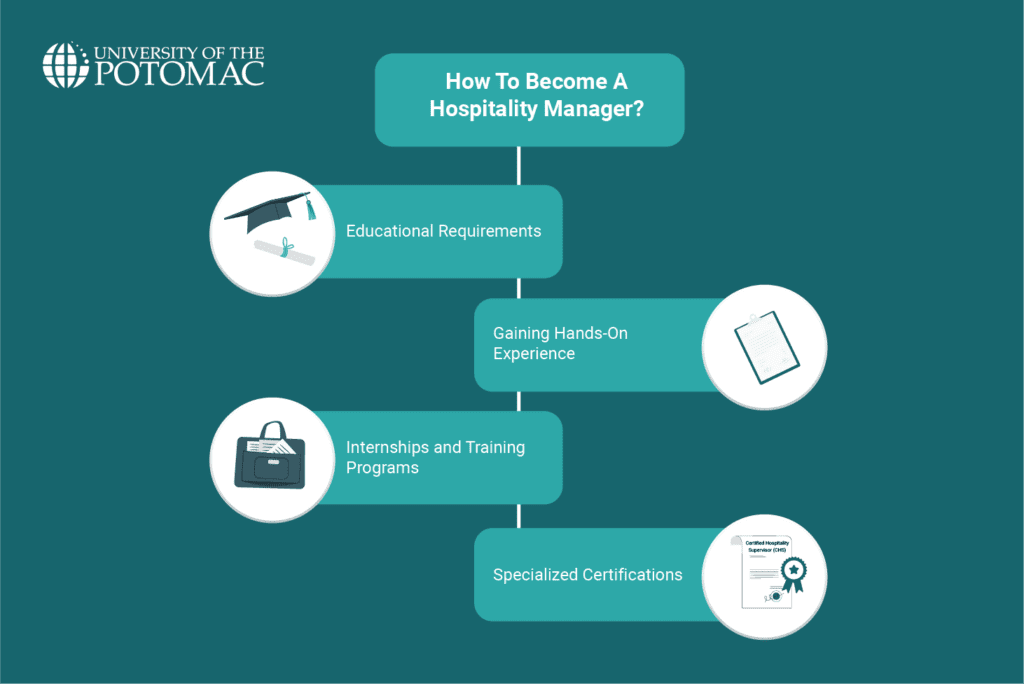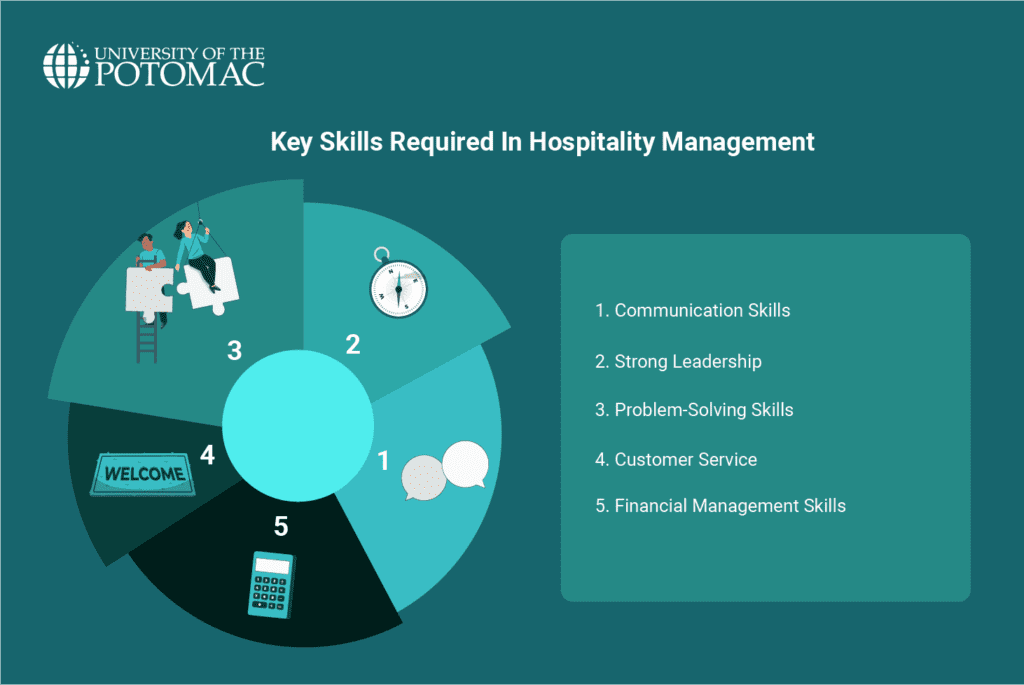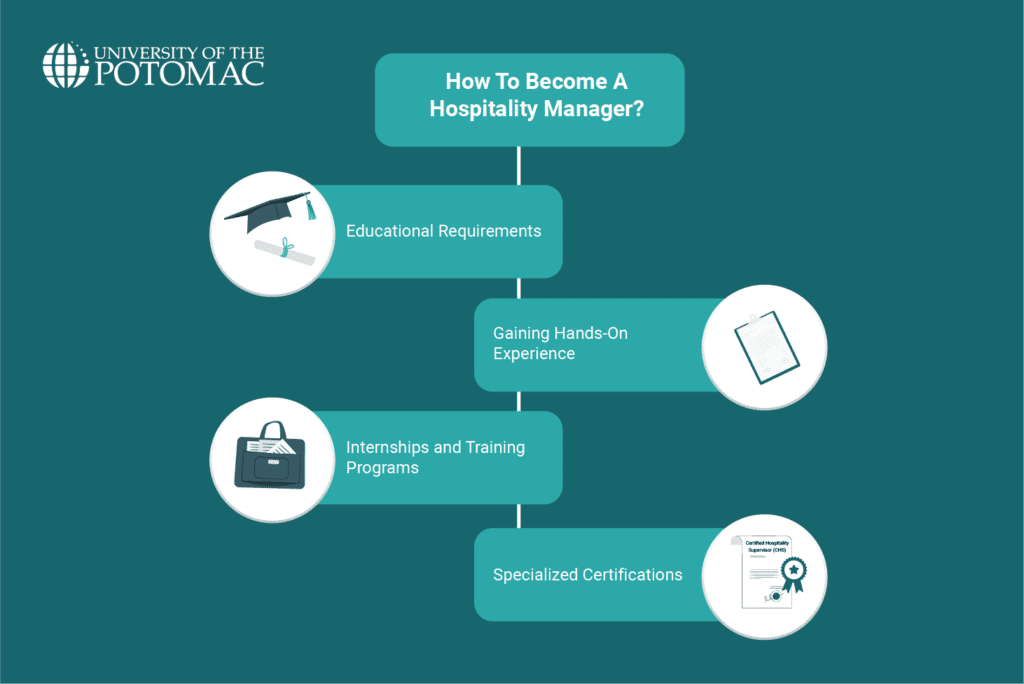- Hospitality Management blends customer service with business operations across sectors like hotels, restaurants, and events.
- Becoming a Manager requires a combination of education, experience, internships, and certifications.
- Skills for Success include communication, leadership, problem-solving, and financial management.
- Career Benefits include diverse opportunities, career growth, travel, and the chance to make a positive impact.
Did you know that the global hospitality market reached over $4.7 trillion in 2023? This thriving industry relies heavily on hospitality management—the people behind the wheel who ensure excellent guest experiences and maintain smooth operations across hotels, resorts, restaurants, and more.
In this blog, we’ll dive into what hospitality management is all about, what hospitality managers do on a daily basis, and how you can start a career in this exciting field.
What Is Hospitality Management?
Hospitality management is a career path that involves managing a business in the hospitality industry. The hospitality industry includes hotels, restaurants, event management, tourism, and any other sector focused on providing an outstanding guest experience to customers.
Because hospitality management is as much service-oriented as it is a business-focused field, you will need a blend of customer service skills to ensure guest satisfaction and business acumen to effectively manage resources, budgets, and staff.
What Do Hospitality Managers Do?
The main duty of hospitality managers is to ensure smooth operations and a high-quality customer experience. Their day-to-day responsibilities include managing staff schedules and fostering effective communication among employees. Moreover, hospitality managers often manage staff training to ensure employees are well-prepared for their roles.
In addition to their people-managing duties, they ensure customer satisfaction by attending to guests’ needs and addressing any possible complaints.
As they have an overarching management role, hospitality managers are responsible for managing the budget, monitoring expenses, and analyzing financial reports. They also work closely with other departments, like marketing or maintenance, to ensure that everything runs smoothly.
How To Become A Hospitality Manager?

Interested in a career as a hospitality manager? You’ll need a mix of education, experience, and training to be successful in this field. Here is a breakdown of the steps to becoming a hospitality manager.
Educational requirements
To enter the field, start by obtaining a degree in hospitality management, business administration, or a related field. These programs will help your career in hospitality management as they cover topics such as business operations, customer service, financial management, marketing, etc.
Gaining hands-on experience
There is no career that you can have without having some hands-on experience. Fortunately, in hospitality management, you can gain experience through entry-level positions like:
- Front desk associate
- Food service staff
- Event coordinator
These positions offer you a glimpse into what it means to be a hospitality manager through daily operations and guest interactions. Then, you can advance to supervisory roles and ultimately go for the management position.
Internships and training programs
Another way to broaden your knowledge and develop skills to become a hospitality manager is through internships and training programs. Aspiring hospitality managers will usually complete internships in hotels, restaurants, or event planning companies as part of their degree program. For instance, you could intern at a renowned hotel chain or a popular event management company.
Lastly, you can pursue specialized training programs, such as those offered by industry associations or professional development institutes. These programs can be very beneficial for those who want to further hone their skills in specific areas like leadership, budgeting, or marketing.
Specialized certifications
Obtaining certifications like Certified Hospitality Supervisor (CHS) or Certified Hotel Administrator (CHA) is another great way to show your expertise and commitment to the field. These certifications will also improve your job prospects and earning potential, especially if you don’t have a degree.
Key Skills Required In Hospitality Management

As a hospitality manager, your main goal will be to keep your customers satisfied and the business running smoothly. To achieve this, you need industry knowledge and a set of soft skills, including communication, leadership, problem-solving, customer service, and financial management.
First, to thrive in this position, you need stellar communication skills. As a hospitality manager, you are always talking to staff or guests, and knowing how to speak to them will help you solve customer problems faster, give clear and concise directions to your staff, and ensure everything runs smoothly.
As this is a management position, you need to know how to lead your team. When you possess strong leadership skills, you will be able to build and manage the team, motivate your employees on a day-to-day basis, and ensure everyone is doing their part.
Besides, as a hospitality manager, you will be responsible for addressing various issues, such as guest complaints, scheduling problems, service issues, etc. This is why you need to be quick on your feet and find solutions that work for everyone.
Making sure the guests feel welcome and meeting their needs is the very heart of hospitality. This is why hospitality managers should know what guests expect and strive to make their experience even better. “Customer comes first” should be embedded in you, in order to shine in this profession.
Looking into the internal management side, to be a successful hospitality manager you need to possess strong financial management skills. This means you need to have a strong understanding of budgeting, cost control, and revenue management, as through these calculations, you will be able to cut unnecessary expenses and find ways to boost profit.
Benefits Of A Hospitality Management Career

As we have established, hospitality management is a dynamic, people-centered industry, which offers lots of opportunities. Let’s explore below some of the many benefits of pursuing a career in hospitality management.
Diverse opportunities
Hospitality management is a career path that opens doors to a variety of roles and settings. Whether you’d prefer working in hotels, resorts, cruise ships, or event management, you’re sure to find something that fits you in this broad field. It is exactly this diversity in career options that allows professionals like you to find niches that align with their interests and skills.
Interested in pursuing a degree?
Fill out the form and get all admission information you need regarding your chosen program.
This will only take a moment.
Message Received!
Thank you for reaching out to us. We will review your message and get right back to you within 24 hours.
If there is an urgent matter and you need to speak to someone immediately you can call at the following phone number:
- We value your privacy.
Growth potential
The hospitality industry is flourishing and the need for skilled managers will continue to grow throughout the next decade. This continuous growth means you can easily climb the ladder from entry-level positions to senior management roles.
Interpersonal rewards
Hospitality is all about people, making hospitality management quite a rewarding career. As a manager, you’ll build strong teams with your employees to help customers create lasting memories of their holidays and travels.
Travel opportunities
A career in hospitality management will definitely appeal to you if you love traveling and exploring new places. Many hospitality roles involve working abroad, traveling for events, or exploring new destinations, which means you can explore the world while you are getting paid.
Dynamic work environment
One thing is for sure: no two days are the same when you work as a hospitality manager. If you thrive on working in a fast-paced environment with new challenges every day, then you should definitely consider a career in hospitality.
Job Outlook and Salary
The global tourism industry has been blooming in the last decade and it doesn’t show signs of slowing anytime soon. This increase in tourism directly contributes to the demand for skilled hospitality managers.
In the US, employment for hospitality managers is expected to grow 10% by 2033. This growth is driven by new trends in tourism (such as eco-tourism), travel, and event planning.
Although job stability in hospitality can be affected by economic trends, the demand for hospitality managers remains strong because customer experience is always the industry’s top priority.
On top of the strong job growth, a hospitality management career is noted with good salaries, though the salary you get depends on factors such as experience, location, and type of establishment.
Entry-level managers make around $48,522 a year, while more experienced managers working in high-end establishments like luxury hotels can make up to $110,000. Specialized roles such as resort managers or directors of operations often have an even higher salary.
In addition to the base salary, many hospitality managers enjoy extra perks and benefits like performance bonuses, travel discounts, free or discounted accommodations, etc.
Is Hospitality Management The Right Career For You?
Hospitality management could be an excellent career choice for you if you enjoy working in a fast-moving, ever-changing environment. This field also demands flexibility, as it often includes working evenings, weekends, and holidays.
If you enjoy connecting with people, creating memorable experiences, and taking on the responsibility of running operations and making business decisions, this career may suit you perfectly.
So before you take on your journey in hospitality management, ask yourself if you’re excited by a role that blends customer service with business tasks. If the answer is yes, then definitely give a career in hospitality management some serious thought.
Conclusion
In conclusion, a career in hotel management offers a dynamic and rewarding path that blends the opportunity to lead, solve problems, and deliver exceptional guest experiences with the excitement of working in a fast-paced environment.
Interested in exploring a career in hospitality management? Check out the Hospitality Management program at POTOMAC to learn more about the skills and opportunities this exciting field offers.
Frequently Asked Questions
What is the difference between hospitality management and hotel management?
Hospitality management covers a broad range of industries, including hotels, restaurants, and event planning, while hotel management focuses specifically on running and managing hotel operations.
How long does it take to become a hospitality manager?
It typically takes 3-4 years to earn a degree in hospitality management, with additional experience required for higher-level management roles.










